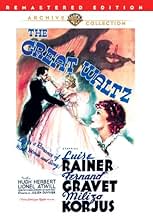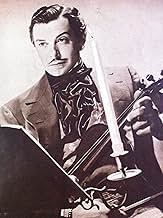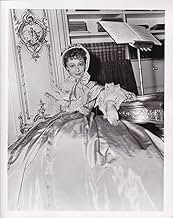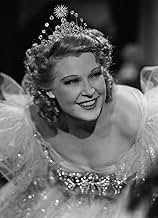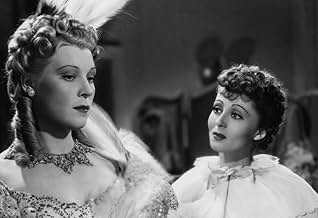IMDb RATING
6.4/10
1.4K
YOUR RATING
Johann Strauss II pursues his passion for waltzes in 1845 Vienna, facing societal resistance. His music gains popularity through opera singers, leading to fame and personal conflicts between... Read allJohann Strauss II pursues his passion for waltzes in 1845 Vienna, facing societal resistance. His music gains popularity through opera singers, leading to fame and personal conflicts between his wife and a passionate affair.Johann Strauss II pursues his passion for waltzes in 1845 Vienna, facing societal resistance. His music gains popularity through opera singers, leading to fame and personal conflicts between his wife and a passionate affair.
- Won 1 Oscar
- 2 wins & 3 nominations total
Fernand Gravey
- Johann Strauss
- (as Fernand Gravet)
Sig Ruman
- Wertheimer
- (as Sig Rumann)
Ernie Alexander
- Revolutionary
- (uncredited)
Featured reviews
A perfect and absolute delight from beginning to end. The great music of Johann Strauss is performed in such beautiful, elaborate settings! MGM reproduced Vienna and the era perfectly. It is too bad this was the only film in which Miliza Korjus appeared. Such a magnificent voice and charming personality! The carriage ride in the Vienna Woods and that final, unbelievable, note she holds for what seems like eternity are never to be forgotten. Luise Rainer is wonderful and could always convey such emotion without ever uttering a word. Perfect casting, with so many great character actors in supporting roles.
Before I started these comments, I first read many of the others made by a wide range of people - I was amazed to find that some were reading far too much into the storyline,( which everyone who has seen the movie knows it is pure hokum) or belittling the film for its treatment of the life of Johann Strauss. Why not go and see it, and enjoy the sheer entertainment of the Music, the acting of Luise Rainer, the voice of Miliza Korjus (who will ever forget her rendition of "One Day When We Were Young" - who cares if Strauss did or did not write it!), So "The Tales from the Vienna Woods" was written overnight - does it matter that free licence was taken, surely the name of the game is to entertain, and this film does that. Hugh Herbert and Lionel Atwill add fun and spice to one of the more entertaining musicals of the 1930's.
Julien Duvivier, the great French director, had a brief career in Hollywood during WWII. Alas, the movies he was involved with, didn't fare as well as the ones he did in France. It must have been difficult for a man of his stature to try his hand at film making in America because of problems with artistic control of his pictures and the way things were done in Hollywood.
"The Great Waltz" was a fine example of what M. Duvivier could do. This glorious 1938 MGM film was one of the most loved films of that period. Not only that, but even if the subject matter, Johann Strauss' life was not accurate, at least his great music is heard in the film. The exquisite art direction Cedric Gibbons gave the picture and the beautiful costumes from Adrian made this a favorite of the movie going public of that time.
The life of the struggling musician who had a lot of talent, but whose music was a departure from what has been heard in Vienna before him, was something movies loved to tell. Whether or not this was a true account of the composer's life, it's still a visually rich film.
Fernand Fravey as Strauss gives a good performance. Luise Ranier makes the suffering and self-sacrificing Poldi, one of her best creations. The true star of the film though, is Milizia Korjus, who as the gorgeous soprano Carla Donner steals the show with her singing and her looks. Hugh Herbert, Alma Kruger, Curt Bois, and the rest of the cast do great work for Julien Duvivier.
"The Great Waltz" is a film that's not seen often these days and it's a shame because it's an excellent excuse for going back to that period and the great music Strauss gave to the world.
"The Great Waltz" was a fine example of what M. Duvivier could do. This glorious 1938 MGM film was one of the most loved films of that period. Not only that, but even if the subject matter, Johann Strauss' life was not accurate, at least his great music is heard in the film. The exquisite art direction Cedric Gibbons gave the picture and the beautiful costumes from Adrian made this a favorite of the movie going public of that time.
The life of the struggling musician who had a lot of talent, but whose music was a departure from what has been heard in Vienna before him, was something movies loved to tell. Whether or not this was a true account of the composer's life, it's still a visually rich film.
Fernand Fravey as Strauss gives a good performance. Luise Ranier makes the suffering and self-sacrificing Poldi, one of her best creations. The true star of the film though, is Milizia Korjus, who as the gorgeous soprano Carla Donner steals the show with her singing and her looks. Hugh Herbert, Alma Kruger, Curt Bois, and the rest of the cast do great work for Julien Duvivier.
"The Great Waltz" is a film that's not seen often these days and it's a shame because it's an excellent excuse for going back to that period and the great music Strauss gave to the world.
10Esierra2
I own a VHS copy of The Great Waltz. I have seen this movie I don't know how many times! I was very young when I saw the movie for the first time, and it made a great impact on me and ever since then, I feel the urge to look and hear the magnificent singer and actress that, in my opinion takes the first place in this movie: MILIZA KORJUS. I have managed to collect ALL her recordings, I think., but I never saw the movie as a political issue or as they say here, as anti Nazi film! Nothing of the sort! To me it's a delightful movie and a great vehicle for the display of the many talents of Miliza Korjus and also for the rest of the cast and the romanticism involved in the whole movie.
Sandwiched,in Duvivier's oeuvre,between two absolute masterpieces "Un carnet de Bal" and the overlooked "La fin du Jour" (some kind of French "Sunset Blvd" ) where the director's pessimism reaches new heights ,"The great waltz " ,unlike another movie made in Hollywood "Flesh and fantasy" cannot be looked upon as a "film d' Auteur".
It's impersonal but it nevertheless displays Duvivier's extraordinary eclecticism."The great waltz" is a good work,made with care and taste and shows that Duvivier could have been a great musicals director,if he had wanted to.Half of the movie consists of instrumentals or songs,which makes sense,for it is a movie dealing with Strauss's life.His private life does not interest that much Duvivier who avoids the traps of a linear biography.However,there are snatches of melodrama towards the end,mainly in the scenes between the moving Luise Rainer and Miliza Korjus in the theater.Fernand Gravey (spelled "Gravet" in the cast and credits)is the only French actor here.He had begun his American career with Mervyn LeRoy in 1937.
All the musical scenes are dazzling ;the "blue Danube" treatment is excellent,a waltz which would be used by dozens of directors,from Renoir ("Boudu Sauvé des Eaux" ) to Kubrik ("2001" ) to Cimino ("Heaven's gate"). Other good sequence: Strauss composing a new tune while he is hearing a horse' s trot.
It's impersonal but it nevertheless displays Duvivier's extraordinary eclecticism."The great waltz" is a good work,made with care and taste and shows that Duvivier could have been a great musicals director,if he had wanted to.Half of the movie consists of instrumentals or songs,which makes sense,for it is a movie dealing with Strauss's life.His private life does not interest that much Duvivier who avoids the traps of a linear biography.However,there are snatches of melodrama towards the end,mainly in the scenes between the moving Luise Rainer and Miliza Korjus in the theater.Fernand Gravey (spelled "Gravet" in the cast and credits)is the only French actor here.He had begun his American career with Mervyn LeRoy in 1937.
All the musical scenes are dazzling ;the "blue Danube" treatment is excellent,a waltz which would be used by dozens of directors,from Renoir ("Boudu Sauvé des Eaux" ) to Kubrik ("2001" ) to Cimino ("Heaven's gate"). Other good sequence: Strauss composing a new tune while he is hearing a horse' s trot.
Did you know
- TriviaToscha Seidel, the Russian virtuoso violinist, was hired especially to dub the solos on the soundtrack for Johann Strauss (Fernand Gravey) and began a new career working as a concert master at MGM and other studios.
- Quotes
Johann 'Schani' Strauss II: Thanks for firing me, Mr. Wertheimer. Goodbye, you worms!
- ConnectionsFeatured in Another Romance of Celluloid (1938)
- SoundtracksTales From the Vienna Woods, Op.325
(1868) (uncredited)
Music by Johann Strauss
Lyrics by Oscar Hammerstein II
Hummed by Fernand Gravey as it is being composed
Sung by Miliza Korjus
Played as background music often
- How long is The Great Waltz?Powered by Alexa
Details
- Runtime
- 1h 44m(104 min)
- Color
- Aspect ratio
- 1.37 : 1
Contribute to this page
Suggest an edit or add missing content


